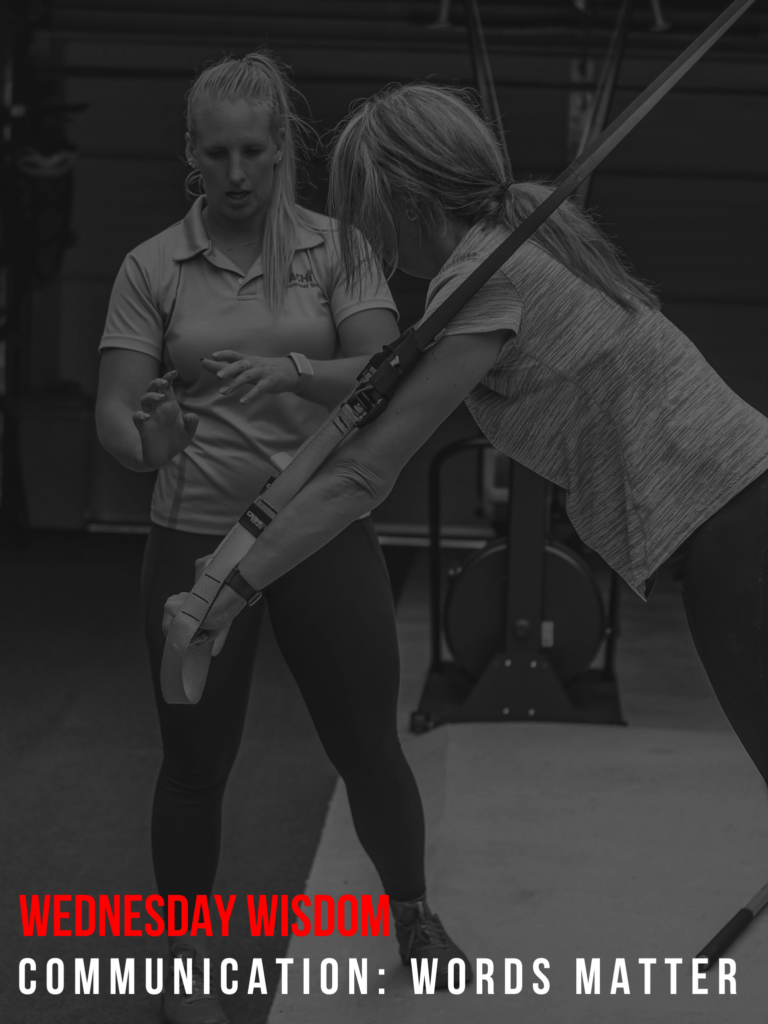Following last week’s post on Assessments (if you missed it scroll down and check it out), it’s paramount to consider how we communicate with clients – from how we share assessment results with them, to how we cue their movement, to how we motivate them.
So for the next few posts we’ll be focusing on coaching communication and language – an area I’m very passionate abut and a topic I believe should get a lot more attention than it currently does in the fitness industry
Communication is a skill.
In my opinion it is THE most important skill you need to develop if you want to be a world class coach.
Why?
Because if you can’t connect with your clients, explain how you want them adjust their movement, what you want them to do or what the plan is to progress them forward, then nothing else matters – you can have all the technical skills in the world and be up-to-date with the latest research, but if you can’t communicate that knowledge effectively your clients will NEVER reap the benefits
Let’s focus on language, because WORDS MATTER!
And no, when I say “language” I’m not simply saying you shouldn’t swear in front of your clients
Avoid words that have a negative connotation when referring to your client’s body or behaviour. Consider the following scenarios…
When you complete a movement screening with a new client:
Of course we need to review assessment results and explain what course of action we need to take to improve their movement and mobility, but be mindful in how you say it. Don’t tell someone they have “bad” shoulder mobility or that their ankle mobility is a “massive problem”. Most general population clients will feel nervous and a little uncomfortable when first getting started – maybe they haven’t exercised for a while, had a bad gym experience or even they’ve suffered an injury training in the past. Using words like this will automatically lead them to think there is something wrong with them, and can even instill fear of movement or future injury in their “bad” or “problem” joints. Even using the word “fix” has a negative connotation, again, it implies there is something wrong with them.
Instead of…
️“Your shoulder mobility is bad, we need to fix that before you can do any heavy lifting”,
Try…
“Right now your shoulders seem quite restricted so I’d love to boost your shoulder mobility as our first priority. That means you can move more freely and get optimal muscle activation, so you’ll get stronger faster”.
When your client is dong an exercise that’s too advanced for their level:
Whether they just can’t move their body that way (yet) or they’re pushing themselves trying to keep up with someone else in the class, it’s obviously very important you ensure everyone is working at a level that will help them progress forward, not cause injury! The words “progression” and “regression” are used by PTs in programming all the time, but don’t use the word “regression” with your clients, it will only make them feel like a failure.
Instead of…
“I think that exercise is too hard for you, let’s regress it to this for now…”
Try…
“Try this variation for now, and in a week or two you’ll be able to smash that other exercise!”.
When your client can’t grasp the correct technique:
You might have explained an exercise and corrected them SO many times – you might want to face palm or just frustratedly say “no, you’re doing it wrong again” (we’ve all been there, right?! ). But just don’t do it!
Instead of…
“Nope, you’re doing it wrong again. Do this…”
Try…
“Okay, your feet are in the perfect position, but let’s adjust your shoulders like this…”
Side Note: Something else to consider on technique – we’re always so quick to want to roll our eyes and blame our clients for not getting an exercise right, but they truth is maybe you haven’t explained it clearly in a way they understand! We’ll be covering this in next week’s post
Ensuring your clients walk out the door of every session feeling positive and like they’re on the way to smashing their goals is KEY for two reasons…
- They come to us so we can support them, educate them, empower them and help them reach their goals. The last thing we would ever want to do is make a client feel incompetent or shatter their confidence, that’s not what a coach does!
- I don’t say all this just with your clients’ feelings in mind, it also comes down to client retention – your financial security and success! Failing to communicate well with your clients will either lead to a lack of progress or they’ll walk away feeling worse (or both), and these things will undoubtedly result in that client giving up or looking elsewhere for help.
ALWAYS be mindful of your choice of words and the connotations they can have to your clients.
So, we’d love to hear from you…
What phrases or words you need to adjust when you’re coaching and get to work so you can boost your client experience?
(notice I said “adjust” and “boost”, not “what are you doing poorly” or “what do you need to fix” )
For for Newsletter

